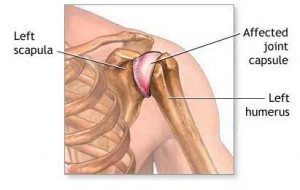Frozen Shoulder Syndrome and Chiropractic Rehabilitation
Frozen shoulder (FS),medically referred to as adhesive capsulitis, is a disorder in which the the connective tissue surrounding the glenohumeral joint, becomes inflamed and stiff, and grows together with abnormal bands of tissue, called adhesions, greatly restricting motion and causing chronic pain. Some people experiencing this kind of problem don’t go for any forms of treatment in order to gain back the motion of their joints. The condition will get better eventually without treatment but it will take a very long time to do so. The pain and the reduced Range of Motion without any form of treatment means only one thing, you won’t be able to function to a full capacity. The more you try to move your joint, the more pain you will experience. Therefore, it is best to seek treatment for pain control. There several options for patients who have frozen shoulder pain:
1. Oral and Injectible Steroids
2.Hydrodilation and Hydroplasty
3. Chriopractic rehabilitation with Physical Therapy
4. Manipulation Under Anesthesia
Frozen shoulder(FS) is more common for people between the ages of 40 and 60. If you have diabetes, you are more prone to experiencing frozen shoulders as around 20% of diabetic patients also suffer from this condition at one point. Though, the actual causes of FS are still inconclusive but there are risk factors that may increase your chances of suffering from this condition. The conditon is twice more common in women than men. If you are between the ages of 40 and 60 and female who has diabetes, you have a higher risk of acquiring a frozen shoulder. Endocrine problems also increase your chance of experiencing a frozen shoulder. If you have Parkinson’s disease, you are also at a higher risk of suffering from a FS. Lastly, if you suffered from a shoulder injury or trauma and you immobilized your shoulder joints for a long period of time, you have the highest risk of developing a frozen shoulder.
According to health professionals who treat FS, the condition generally follows a course of three stages:
- Stage one: a slow onset of pain, and the shoulder gradually loses the range of motion. This stage can last from six weeks to nine months.
- Stage two: a slow improvement in pain relief, with stiffness remaining. This stage can last from four to nine months.
- Stage three: a “thawing” as shoulder slowly regains motion and pain is relieved. This stage can last from five to 26 months.
There are two options for a treatment of FS: nonsurgical and surgical treatment. As a rule of thumb, the health care professional would advise the least invasive treatment first before they ask for a surgical intervention. For nonsurgical treatment there are chiropractic care and physical therapy, manipulation under anesthesia, as well as pain control using steroid medication.
Chiropractic care is a successful method in easing the frozen shoulder pain. Doctors of Chiropractic use TENS units, Ultraound, Erchonia Cold Laser PL 5000, stretching, educating patients about lifestyle change and diet. The length of time spent on the chiropractic treatment depends on the severity of the condition. If the pain is more advance it can take months to rehabilitate the shoulder. Chiropractic can limit the devastating effects of all forms of physical disability such as FS. At this point research into its cause remains inconclusive.
As a general rule, prevention is better than cure. With chiropractic care, you can prevent FS even before it sets in. When you start feeling a slight pain in your shoulder area, you can try chiropractic care to avoid the stiffening of the joint that causes extreme pain and immobilization. If prevention is unsuccessful, treating the frozen shoulder with chiropractic care requires the use of modalities, chiropractic adjustmnts and deep tissue massage. This treatment is used to manage the pain, inflammation and increase range of Motion.
In the majority of cases, chiropractic involves few risks and has been proven beneficial in treating a FS syndrome. Reputable chiropractic professionals will assure their patients of the best program to follow in maintaining optimum physical movement and a quality life.
